Journalistische Artikel
Interview zu dem Vortrag auf der Marx is Muss Konferenz 2015
Interview mit Dario Azzellini nach dem Vortrag zu "Ihr repräsentiert uns nicht!" Soziale Bewegungen vom 15M bis Occupy
"In ihrem neuen Buch “They Can’t Represent Us! Reinventing Democracy from Greece to Occupy” geben Marina Sitrin und Dario Azzellini einen Einblick in die verschiedenen sozialen Bewegungen in Spanien, Griechenland, den USA, Argentinien und Venezuela. Sie zeigen die Gemeinsamkeiten auf und diskutieren die Unterschiede in den Ländern. Was ist von ihnen geblieben? Auch nachdem vieler dieser Bewegungen aus den Medien verschwunden sind, lebt ihr Erbe weiter. Sitrin und Azzellini beschreiben, wie aus ihnen zahlreiche Basisinitiativen entstanden.
For over 100 years May Day has been celebrated by workers, socialists, anarchists, autonomists, and a myriad of other radicals.
Revolutionary May Day in Berlin: It Began with a Riot
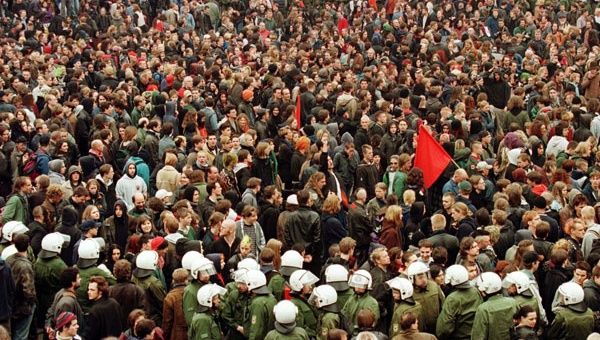
Ed.: this post is part of a series dealing with Austria’s history of fascism. Further entries can be found here.
Persecution and Exile of Austrian Sociological Authors During Fascism

Hundreds of Austrian sociological authors were persecuted and exiled during fascism between 1933 and 1945, most of them Jews, but also a large number of non-Jewish liberals, democrats, socialists and communists. The repression began during “Austro-fascism” between 1933/34 and the “Anschluss” to Nazi Germany in March 1938 – which was welcomed by most of the Austrian population. As soon as Austria joined the “Third Reich” German forces and Austrian volunteers unleashed a wave of terror imprisoning more than 70,000 people in a few days.
Entrevista a Dario Azzellini, politólogo y documentalista, miembro del Consejo Editorial de Working USA
En Europa, en el marco de la crisis actual, el movimiento de empresas recuperadas por sus trabajadores está ...
En Europa, en el marco de la crisis actual, el movimiento de empresas recuperadas por sus trabajadores está dando sus primeros pasos
Interview with Marina Sitrin and Dario Azzellini about their new book 'They can't represent us!'
Link to the audio interview with Marina Sitrin and Dario Azzellini about their new book 'They Can't Represent Us!: Reinventing Democracy from Greece to Occupy'
Infos rund um das Sportereignis
Fußball-WM im WUK
Die Fußball-Weltmeisterschaft findet heuer in Brasilien statt – und wird auch im Innenhof des WUK mittels public viewing gezeigt. In dieser Sendung beschäftigen sich WUK Radio mit den politischen und sozialen Konnotationen dieses Großereignisses.
Sendungsgestaltung: Jürgen Plank
Mit: Dario Azzellini
You are missing some Flash content that should appear here! Perhaps your browser cannot display it, or maybe it did not initialize correctly.
Translation into Portuguese of the article 'Venezuela: Where the Wealthy Stir Violence While the Poor Build a New Society' published on Creativetimereport, April 28, 2014
Venezuela: Os ricos incitan à violência enquanto os probres constroem uma nova sociedade
Antes de Hugo Chávez ter chegado à presidência da Venezuela em 1999, os bairros de Caracas construídos precariamente nos morros nos subúrbios da capital nem sequer apareciam no mapa da cidade.
Translation into Spanish of the article 'Venezuela: Where the Wealthy Stir Violence While the Poor Build a New Society' published on Creativetimereport, April 28, 2014
Venezuela: Los ricos incitan a la violencia mientras los pobres contruyen una nueva sociedad
Antes de que Hugo Chávez llegara a la presidencia de Venezuela en 1999, los barrios de Caracas construidos precariamente en los cerros en los suburbios de la capital ni siquiera aparecían en el mapa de la ciudad.
Translation into Bosnian of the article "Workers’ control at Fralib: the brand with the Elephant" published on roarmag, May 1, 2014
Radnička Borba: Okupacija tvornica u Francuskoj
Kada je velika multinacionalna kompanija Unilever zatvorila tvornicu čaja na jugu Francuske radnici su okupirali svoju fabriku
U Francuskoj postoje dva slučaja oživjelih tvornica koje su okupirali radnici tokom krize. Jedna je Pipla Ice Cream Factory, koja je upravo počela proizvoditi organski sladoled i jogurt kao tvornica koju vode i čiji su vlasnici radnici, nakon dugotrajne borbe. Druga je Fralib Tea Factory. Obje su bili zatvorene nakon što su njihovi vlasnici, velike multinacionalne kompanije, odlučile preseliti proizvodnju.
Nem képviselnek minket! – interjú Dario Azzellinivel és Marina Sitrinnel
A Helyzet Műhely és a PERG meghívására Marina Sitrin (MS) New York-ban dolgozó író, aktivista és Dario Azzellini (DA) Berlinben és Caracasban dolgozó művész és dokumentumfilm-rendező a globális mozgalmak helyzetéről és lehetséges jövőjéről tartottak előadást a múlt hónapban. A Gólyában az általuk Caracasban forgatott Comuna Under Construction (2010) című dokumentumfilm vetítése után Meszmann Tibor (MT) beszélgetett velük.
MT: Aktivisták vagytok és akadémikusok. Nemcsak kutatjátok, részt is vesztek társadalmi mozgalmakban. Hogyan látjátok a saját szerepeteket?
Translation into Italian of the article "Workers’ control at Fralib: the brand with the Elephant" published on roarmag, May 1, 2014
Controllo operaio alla Fralib
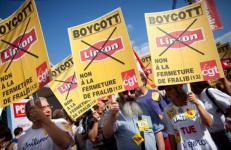
In Francia ci sono due casi di fabbriche recuperate occupate dai lavoratori nel corso della crisi attuale. Una è la fabbrica di gelati Pilpa, che ha appena avviato la produzione di gelati e yogurt biologici come società di proprietà dei lavoratori e gestita da essi dopo una lunga lotta. L’altra è la produttrice di tè Fralib. Entrambe erano state chiuse dalle loro gigantesche proprietarie multinazionali per delocalizzare la produzione.
Translation into hungarian of the article 'Venezuela: Where the Wealthy Stir Violence While the Poor Build a New Society' published on Creativetimereport, April 28, 2014
Venezuela: Ahol a jómódúak erőszakot gerjesztenek, miközben a szegények egy új társadalmat hoznak létre
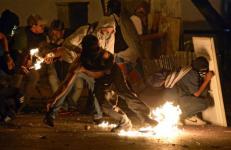
A művész és dokumentumfilmes, Dario Azzellini szerint a tüntetések Venezuelában aljas támadást jelentenek az ország Hugo Chávez elnöksége alatti társadalmi fejlődése ellen, a jómódú régiók anti-chavista erői részéről.
Traduzione in italiano dell'articolo 'Venezuela: Where the Wealthy Stir Violence While the Poor Build a New Society' pubblicato su Creativetimereport, April 28, 2014
Venezuela: dove i ricchi fomentano la violenza e i poveri costruiscono la nuova società
L’artista e documentarista Dario Azzellini sostiene che le proteste in Venezuela rappresentano un feroce attacco al progresso sociale del paese ottenuto durante il governo di Hugo Chávez, incoraggiato da politici anti-chavisti che vivono nelle zone dei benestanti.
Prima che Hugo Chávez diventasse presidente del Venezuela nel 1999, i barrios di Caracas, costruiti alla buona sulle colline che circondano la capitale, non comparivano nemmeno sulla mappa della città.
Translation into Zchech of the article 'Venezuela: Where the Wealthy Stir Violence While the Poor Build a New Society' published on Creativetimereport, April 28, 2014
Venezuela: Bohatí podněcují násilí, chudí budují společnost
Než se v roce 1999 stal prezidentem Venezuely Hugo Chávez, caracaské barrios, postavené na kopcích obklopujících metropoli, se ani neobjevovaly na mapě města. Oficiálně neexistovaly, město ani stát neudržovaly svou infrastrukturu. Chudí obyvatelé těchto čtvrtí získávali vodu a elektřinu, když se na kabely a trubky napojovali sami. Neměli přístup k různým službám jako je odvoz odpadu, zdravotní péče a vzdělání.
When the big multinational Unilever shut down a tea processing plant in the south of France, the workers reacted immediately by occupying their factory.
Workers’ control at Fralib: the brand with the Elephant
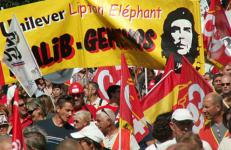
In France there are two cases of recuperated factories occupied by workers during the current crisis. One is the Pilpa Ice Cream Factory, which just started producing organic ice cream and yoghurt as a worker-owned and administered company after a long-lasting struggle. The other is the Fralib Tea Factory. Both were closed by their huge multinational owners to relocate production.
Artist and documentary filmmaker Dario Azzellini argues the protests in Venezuela represent a vicious attack on the country's social progress under Hugo Chávez, spurred on by anti-Chavista politicians in affluent regions.
Venezuela: Where the Wealthy Stir Violence While the Poor Build a New Society
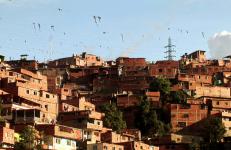
Before Hugo Chávez became president of Venezuela in 1999, the barrios of Caracas, built provisionally on the hills surrounding the capital, did not even appear on the city map. Officially they did not exist, so neither the city nor the state maintained their infrastructure. The poor inhabitants of these neighborhoods obtained water and electricity by tapping pipes and cables themselves. They lacked access to services such as garbage collection, health care and education altogether.
Chávez e il Potere Costituente
“No, il potere costituente non può essere ostacolato, non può essere ostacolato dal potere costituito [...] Alcuni autori parlano della terribile natura del potere costituente. Penso che sia terribile il potere costituente, terribile, complesso, rivoluzionario ma ne abbiamo bisogno. Non ci si dovrebbe sottomettere al potere costituente [...] il potere costituente è e deve essere- compatrioti- una potenza permanente, una potenza di elaborazione, un’iniezione rivoluzionaria, per ripristinare, molto occasionalmente, il nostro processo bolivariano”.
Gewaltsame Destabilisierung und Paramilitarismus hängen in Venezuela eng zusammen
Der Krieg gegen das Soziale
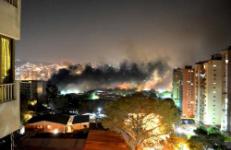
In deutschen und internationalen Medien ist immer noch von "Protesten" in Venezuela und "Toten bei Protesten" zu lesen – doch mit dem, was gemeinhin als "Protest" verstanden wird, haben die Aktionen kleiner, bewaffneter, agiler Gruppen seit spätestens Anfang März nichts mehr gemein. Nachdem die gewalttätige Mobilisierung der Opposition, die Anfang Februar begann und von einer beispiellosen internationalen Medienkampagne begleitet wurde, ihr Ziel des Sturzes der Regierung in Venezuela nicht erreichen konnte, sind die Aktionen zunehmend in Terrorismus übergegangen.
Interview with Dario Azzellini and Marina Sitrin by Anna Belladelli
In September 2011, activists occupied Zuccotti Park in Manhattan, initiating a new wave of struggle against capitalism and unprecedented recession. The impact of the Occupy movement has been noticeable also outside the USA, affecting forms of protests, actions, and language.
The grassroots of Venezuela
The mainstream media view has it that left-leaning populists are keeping democracy in a stranglehold. Seen from the grassroots in Venezuela, that view is very different. We interview Dario Azzellini, an assistant professor, activist who spends a lot of time in Venezuela, and a filmmaker.
You are missing some Flash content that should appear here! Perhaps your browser cannot display it, or maybe it did not initialize correctly.
Öffentlichkeit Reloaded
Der Raum des Politischen, das heißt der öffentlichen Debatte, der Partizipation und des Mitentscheidens wurde sukzessive verengt. Warum und welche möglichen Auswege es gibt versuchen wir anhand der bisherigen Sendungen zum Thema #Öffentlicher Raum #Öffentlichkeit real und virtuell nachzuzeichnen.
Mit Dario Azzellini u.a.
Moderation: Daniela Schopf und Stefan Greinöcker
You are missing some Flash content that should appear here! Perhaps your browser cannot display it, or maybe it did not initialize correctly.
Aus dem Newsletter Dezember 2013 von Dario Azzellini
Wahlen in Venezuela
Nach den letzten Berechnungen hat die PSUV 241 Gemeinden gewonnen. Weitere Parteien die den Prozess unterstützen haben 14 Bürgermeisterämter gewinnen können und die Opposition 74.
------
Im Newsletter versandter Artikel:
Hablamos con Darío Azzellini, una de las voces que alertan al mundo sobre este fenómeno
Soldados élite de los ejércitos modernos son extranjeros
Desde el final de la guerra fría, las características de los conflictos en el mundo cambiaron. Cada vez los ejércitos de los países más poderosos del planeta, enfrentan los choques internacionales, con soldados extranjeros o comúnmente llamados mercenarios, altamente capacitados en combate y manejo de nuevas tecnologías en sus países de origen.
Wirtschaftskrieg in Venezuela: Wie kriminelle Unternehmer das Land terrorisieren
Am 8. Dezember gibt es Kommunalwahlen in Venezuela. Über den Ausgang ist es schwer eine Einschätzung zu treffen. Während das Regierungsbündnis in den vergangenen zwei Wochen wieder deutlich zulegen konnte, spitzt sich der Wirtschaftskrieg innerhalb des Landes weiterhin zu. Der Lateinamerika-Experte und Berliner Gazette-Autor Dario Azzelini kommentiert.
Inszenierte Öffentlichkeit – Gegenöffentlichkeit
Colin Crouch befindet in seiner These der Postdemokratie, dass Politik von Expert_innen und Wirtschaftseliten gemacht wird und Bürger_innen zur passiven Teilhabe degradiert sind. Dario Azzellini, Assistent am Institut für Soziologie der JKU, befindet dass es den Zustand einer partizipativen Demokratie so nie gegeben hat, sondern dass liberale
Demokratien gerade auf Elitenpolitik angelegt sind. Den Begriff politische Öffentlichkeit versucht er an der Privatisierung öffentlichen Raums zu konkretisieren.
You are missing some Flash content that should appear here! Perhaps your browser cannot display it, or maybe it did not initialize correctly.
Imagine a world without bosses
Imagine a world without bosses. This week we discuss examples of workers who run their own workplaces through workers control. Interviews with Alexis Adarfio, from the Workers’ University in Ciudad Guyana, Venezuela; Immanuel Ness, City University of New York, Brooklyn College; and Dario Azzelini, Johannes Kepler University in Austria.
- See more at: http://www.3cr.org.au/sticktogether/podcast/stick-together-24072013#stha...
You are missing some Flash content that should appear here! Perhaps your browser cannot display it, or maybe it did not initialize correctly.
Direct Democracy Under Construction: A Conversation with Dario Azzellini
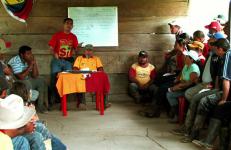
In this episode of Forms of Life, host Nato Thompson speaks with documentary filmmaker, writer and political scientist Dario Azzellini about community organizing and social movements.
Ein Beitritt Kolumbiens zur NATO erfüllt den USA einen Traum und ist ein Dolchstoß für kontinentale Integrationsprozesse wie Unasur oder Celac
Kolumbien in der Nato?
Der kolumbianische Präsident Juan Manuel Santos hat am 1. Juni angekündigt, er strebe Kolumbiens Beitritt zur NATO an. Die Unterzeichnung eines Kooperationsabkommens mit dem westlichen Kriegsbündnis stehe kurz bevor und zeuge von dem Beitrittswillen Kolumbiens. Im Falle eines Friedensabkommens mit der FARC plane Kolumbien ein stärkeres internationales „Engagement“ des eigenen Militärs. Eine Woche zuvor war US-Vizepräsident Joseph Biden bei Santos zu Besuch und wenige Tage später empfing Santos auch den venezolanischen Oppositionsführer Henrique Capriles. Sicher kein Zufall.
An Interview with Dario Azzellini
Workers Control and/or Worker Cooperatives?

GEO: Dario, your co-edited book, Ours to Master and To Own, Workers Control from the Commune to the Present, presents a rich variety of worker control initiatives. These have taken place not only in Europe, but in Algeria, Argentina, Brazil, Canada, India, Indonesia, the USA, Venezuela, Yugoslavia, and other countries. Can you clarify for us what these examples have in common, and what you see as their importance?























